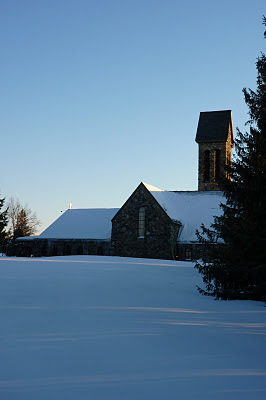
Cultivating mindfulness of God throughout the day is the goal of each monk. Here we see Brother Jonah pondering the Word in the Abbey cloisters and scriptorium.

Our Constutions tell us: Careful lectio divina greatly strengthens the brothers' faith in God. This excellent monastic practice, by which God's Word is heard and pondered, is a source of prayer and a school of contemplation, where the monk speaks heart to heart with God. For this reason, the brothers are to devote a fitting amount of time each day to such reading.

In a spirit of compunction and intense desire, monks devote themselves frequently to prayer. While dwelling on earth, their minds are occupied with heavenly things, desiring eternal life with all spiritual longing

Our Constutions tell us: Careful lectio divina greatly strengthens the brothers' faith in God. This excellent monastic practice, by which God's Word is heard and pondered, is a source of prayer and a school of contemplation, where the monk speaks heart to heart with God. For this reason, the brothers are to devote a fitting amount of time each day to such reading.

In a spirit of compunction and intense desire, monks devote themselves frequently to prayer. While dwelling on earth, their minds are occupied with heavenly things, desiring eternal life with all spiritual longing









 We can almost sense John’s resistance as suddenly he looks up and notices that his cousin Jesus is next in line for his baptism of repentance. In fact Scripture scholars tell us that this episode in the life of Jesus is among the most certain of all historical facts in the Gospel tradition. For in the light of their Resurrection faith, early Christians were most certainly very embarrassed by this memory of the One whom they believed was Messiah and Lord.
We can almost sense John’s resistance as suddenly he looks up and notices that his cousin Jesus is next in line for his baptism of repentance. In fact Scripture scholars tell us that this episode in the life of Jesus is among the most certain of all historical facts in the Gospel tradition. For in the light of their Resurrection faith, early Christians were most certainly very embarrassed by this memory of the One whom they believed was Messiah and Lord.
